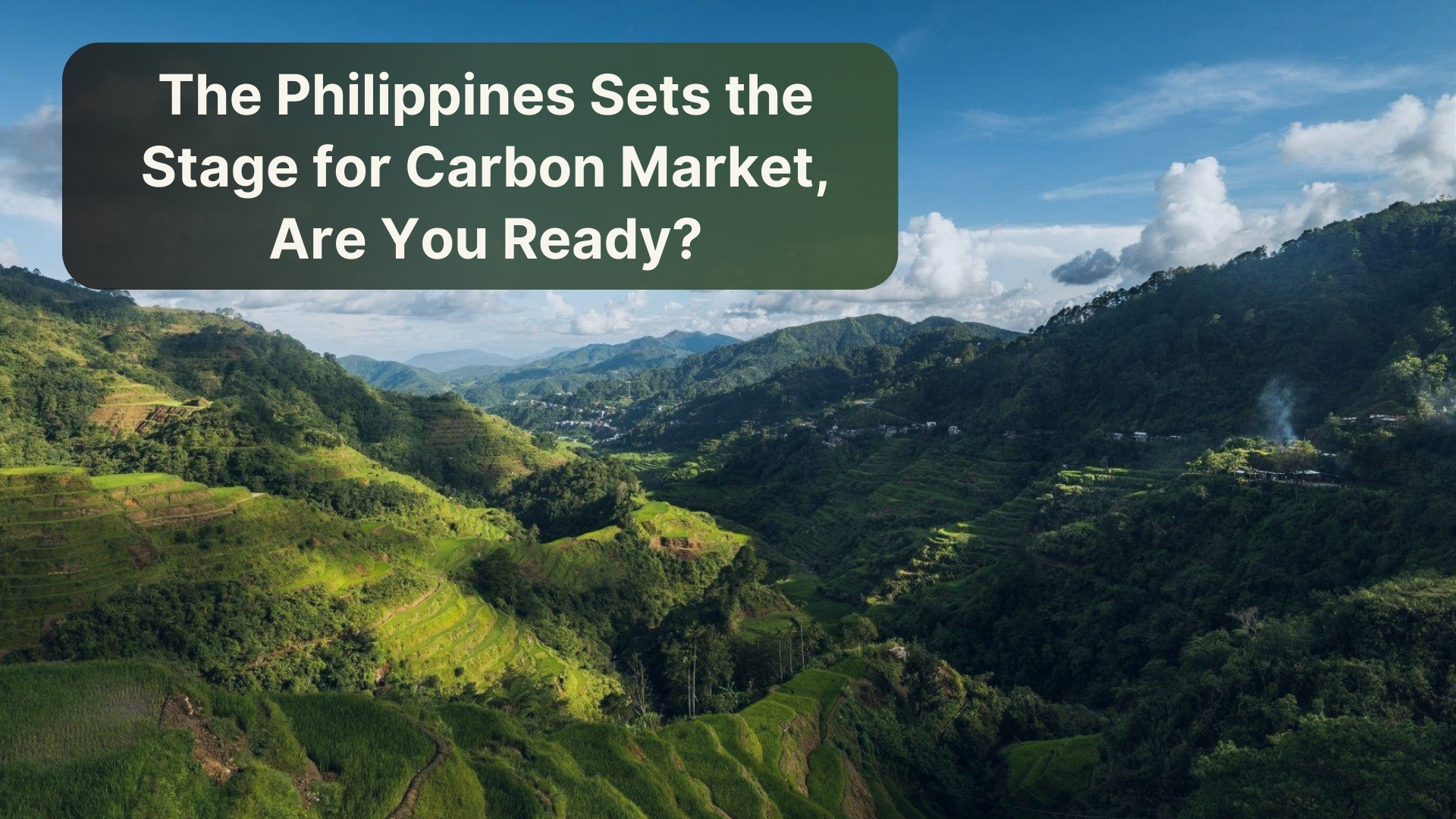Philippines Opens Its Carbon Market: The Time for Action Is Now
News

The Philippines is rapidly emerging as a key player in the global carbon market, driven by strong legislative support, international collaborations, and an increasing demand for carbon credits. With a clear regulatory roadmap, extensive investment-ready land, and ambitious climate commitments, the country presents a compelling opportunity for carbon project developers.
Strengthening the Carbon Market Framework
On February 4, 2025, the House of Representatives approved House Bill No. 11375 on second reading, establishing a carbon pricing framework for Philippine enterprises. This bill requires companies to offset their carbon footprint through emission reductions, low-carbon investments, or carbon credit purchases. It aligns corporate sustainability efforts with national climate goals, ensuring structured private sector participation in decarbonization efforts.¹
Bohol Representative Edgar M. Chatto, chair of the House Climate Change Committee, emphasized that companies exceeding emission targets must invest in environmental sustainability projects, reinforcing corporate responsibility in carbon reduction initiatives.¹
International Commitments and Market Expansion
The Philippines has demonstrated its commitment to global climate goals, having ratified the Paris Agreement in 2017 and pledged to limit temperature rise well below 2°C. At COP29 in Baku, the government announced its plan to finalize a national carbon registry by the end of 2024 and launch a carbon market blueprint by Q2 2025, enhancing investor confidence and regulatory transparency.³
In a significant move, Singapore and the Philippines signed a Memorandum of Understanding (MOU) to facilitate carbon credit collaboration under Article 6 of the Paris Agreement. Signed by Minister Grace Fu and Philippines' DENR Secretary Maria Antonia Yulo-Loyzaga, and witnessed by Presidents Tharman Shanmugaratnam and Ferdinand Marcos Jr., this partnership enables cross-border carbon credit trading and capacity-building for market participants.²
Further strengthening its carbon market readiness, the Japanese government published a draft Article 6.2 methodology to issue carbon credits for emission reductions in Philippine rice paddy fields. Announced on June 28 by Japan’s Ministry of Agriculture, Forestry, and Fisheries, this marks a crucial step in expanding the Philippines’ participation in international carbon markets.⁶
Enabling Private Sector and Sovereign Carbon Credit Initiatives
The Climate Change Commission of the Philippines signed a memorandum of cooperation with Maharlika Carbon Technologies to promote voluntary and sovereign carbon credits. Under this agreement, Maharlika Carbon Technologies will assist in developing the national carbon registry, linking it with the United Nations Framework Convention on Climate Change (UNFCCC) to facilitate trading of Certified Emissions Reductions (CERs) and Internationally Transferred Mitigation Outcomes (ITMOs).
According to House Committee on Ways and Means Chairman Joey Salceda, the Philippines could be the first country to sell sovereign carbon credits, with an estimated initial benefit of USD 14 billion from carbon market participation.⁴
Why the Philippines is Ideal for Carbon Project Development
- Regulatory and Policy Clarity – The upcoming carbon pricing framework and national carbon registry provide a structured foundation for carbon project implementation.
- 1.2 Million Hectares of Investment-Ready Land – The DENR has identified extensive areas for reforestation, agroforestry, and sustainable land use projects, offering vast opportunities for carbon sequestration initiatives.⁷
- Strong Nationally Determined Contribution (NDC) Commitment – The Philippines has committed to a 75% reduction in GHG emissions by 2030, signaling strong government support for climate mitigation projects.⁵
- Growing Carbon Credit Demand – With House Bill No. 11375, businesses will seek carbon credits to comply with regulations, driving demand for high-integrity carbon projects.¹
- Regional Leadership in Carbon Markets – The Philippines actively engages with partners like the Asian Development Bank (ADB) to scale voluntary carbon market participation and enhance international carbon trading mechanisms.⁶
Moving Forward: A Call to Carbon Project Developers
The Philippines is building a robust carbon market ecosystem backed by strong policies, international collaborations, and rising private sector engagement. With legislative clarity, vast project-ready land, and a structured carbon pricing mechanism, the country is well-positioned for nature-based solutions and carbon sequestration initiatives.
Now is the ideal time to start your carbon project in the Philippines. Partner with Fairatmos to develop high-integrity carbon projects and seize emerging opportunities in this dynamic market.
Visit our 🌐 website to learn more!
📩 Contact our team - HERE
Reference list:
- Basilio, K.C.L. (2025). House carbon pricing framework bill approved on 2nd reading. [online] BusinessWorld Online. Available at: https://www.bworldonline.com/the-nation/2025/02/04/651200/house-carbon-pricing-framework-bill-approved-on-2nd-reading/.
- Ministry of Trade and Industry Singapore (2024). Singapore and the Philippines sign Memorandum of Understanding to collaborate on Article 6 to accelerate climate action. [online] MTI. Available at: https://www.mti.gov.sg/Newsroom/Press-Releases/2024/08/Singapore-and-the-Philippines-sign-Memorandum-of-Understanding-to-collaborate.
- Pandey, N. (2025). COP29: BRIEFING – Philippines to finalise national registry basics by year-end, ready carbon market blueprint by Q2 2025. [online] Carbon Pulse. Available at: https://carbon-pulse.com/342062/.
- Reccessary (2023). Philippines ready to sell sovereign carbon credits, says lawmaker | NEWS | Reccessary. [online] Reccessary. Available at: https://www.reccessary.com/en/news/ph-regulation/philippines-ready-sell-sovereign-carbon-credits-says-lawmaker.
- UNDP (2021). Philippines. [online] UNDP Climate Promise. Available at: https://climatepromise.undp.org/what-we-do/where-we-work/philippines.
- Yin, I. and Kumagai, T. (2024). Japan, Philippines to develop Article 6.2 carbon credits from agriculture projects. [online] S&P Global. Available at: https://www.spglobal.com/commodity-insights/en/news-research/latest-news/energy-transition/070124-japan-philippines-to-develop-article-62-carbon-credits-from-agriculture-projects.
- Department of Environment and Natural Resources (2025). OPENING REMARKS OF DENR SECRETARY MARIA ANTONIA YULO LOYZAGA (During the 2nd Philippine-Japan Environment Week , 14 January 2025, Makati City) | DENR. [online] GOVPH. Available at: https://denr.gov.ph/secretarys-corner/opening-remarks-of-denr-secretary-maria-antonia-yulo-loyzaga-during-the-2nd-philippine-japan-environment-week-14-january-2025/.
